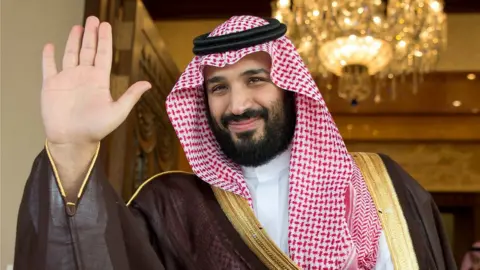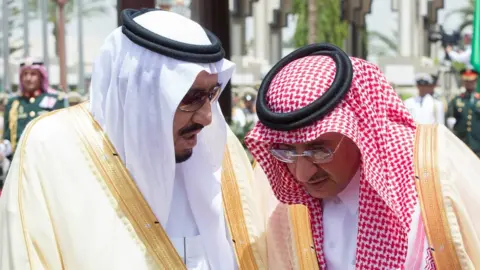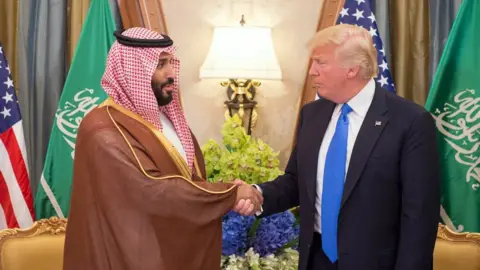Mohammed bin Salman's rise marks climax of leadership revolution
Months of speculation were ended by the issuing of a brief royal decree signed by King Salman.
Crown Prince Mohammed bin Nayef was out, stripped too of his role as interior minister. In came Mohammed bin Salman, the king's 31-year old son, who was elevated from his previous position as deputy crown prince to become heir to the throne.
The announcement was short and to the point, but the implications are enormous.
Mohammed bin Salman's appointment represents the climax of a leadership revolution that began when the late King Abdullah was succeeded by King Salman in January 2015.
One of the first actions of the new monarch was to appoint his young son Mohammed as deputy crown prince, second in line for the throne.
Out with the old
This new team swept aside many of the traditional leadership practices. Moribund state institutions were either scrapped or merged into leaner and more efficient bodies. The whole government decision-making process was streamlined.
Indeed, so dramatic was the reshaping of the leadership that many of the reins of power ended up in the hands of the deputy crown prince. He became defence minister, as well as the key strategist for the Saudi economy and the all-important oil sector. All the while, the powers of Mohammed bin Nayef 's interior ministry were being eroded and brought under the royal court's umbrella.
 Reuters
ReutersOvernight, the long-established modus operandi of the House of Saud had changed. The traditional time-consuming custom of princes being consulted in private to seek consensus before major decisions were made was thrown out of the window. The king and his son decided what needed to happen, and decided quickly.
This had an impact on both domestic and regional policies. At home, the new leadership believed that a broad economic reform programme was needed. Within months, with considerable input from international consultants, Mohammed bin Salman launched Vision 2030, an extremely ambitious plan to end, as he put it, the kingdom's addiction to oil. Aside from phasing out Saudi Arabia's dependence on oil revenue, it envisages a vastly increased role for the private sector and the creation of new jobs for young Saudis.
In the broader Middle East, King Salman and his son decided that Saudi Arabia should adopt a regional superpower role to block what they regarded as Iranian meddling in predominantly Sunni Muslim Arab states.
In that context, Mohammed bin Salman in March 2015 out of the blue launched a military campaign in Yemen.
With the support of other Gulf states the aim was to crush a Shia Houthi rebellion. What was intended to be a swift and decisive campaign has turned into a war that neither side seems likely to win, resulting in widespread civilian suffering and attracting negative publicity for the kingdom.
 Reuters
ReutersMost recently Saudis were taken by surprise when the kingdom joined the United Arab Emirates in imposing a blockade on Qatar. The Doha leadership's friendship with Iran was one of the factors behind the move. Again, how this crisis will be ended is far from clear.
So Mohammed bin Salman certainly faces challenges, but they appear not to worry him. He is, undoubtedly, energetic and determined, although his critics say he's impulsive and can be reckless.
Whatever view Saudis may take they face the prospect of a young man possibly being on the throne for three or four decades - a far cry from the tradition of men in their 70s or 80s ascending to the throne.
On the positive side, then, Saudis should look forward to a long period of internal stability, without constant and unsettling speculation over the succession. On the other hand, with strong personal and public support from President Trump, Mohammed bin Salman is likely to intensify the kingdom's campaign against Iran and perceived Iranian attempts to stir up Shia communities in Arab countries. This doesn't augur well for Gulf stability.
 EPA
EPAAs part of his regional strategy, Mohammed bin Salman is likely to increase efforts to bring the other five members of the Gulf Cooperation Council (GCC) under the Saudi wing - the Qatar blockade is designed to have this effect.
How the senior princes in the House of Saud view all these policies remains to be seen. Not all believe that the young crown prince is the right man for the job - he didn't receive unanimous backing from the royal Allegiance Council. Three of its 34 princes held back from supporting him.
In private, one hears concerns about his ability to end the war in Yemen, deal with mounting youth unemployment, and so on.
But such details won't worry a man who is likely to bring a much more presidential style to the monarchy than any king before him. For Arab presidents tend to get their way.
Gerald Butt is a Middle East analyst and regional adviser to Oxford Analytica, a consultancy firm
